Editors’ Note: East Village Magazine conducted in-person interviews with both Mayor Sheldon Neeley and Karen Weaver, who are facing off in the Nov. 8 election — Neeley for a second consecutive term, Weaver for a return to the office Neeley won from her by 205 votes in 2019.
The candidates were provided an identical set of questions in advance; answers here combine direct quotes and in some cases paraphrases and light editing of their answers for clarity and coherence. In each case EVM asked one question specific to the candidate. The Neeley interview is available here.
By Tom Travis and Jan Worth-Nelson
A Flint native, Karen Weaver is the youngest of three children, daughter of a pediatrician — the first black member of the Flint Board of Education; and the first black school teacher in the city of Flint.
A 1977 Northern High School grad, Weaver holds a bachelor’s from Tougaloo College, a historically black college, a masters degree from Long Island University, and a doctorate in clinical psychology from Michigan State University.
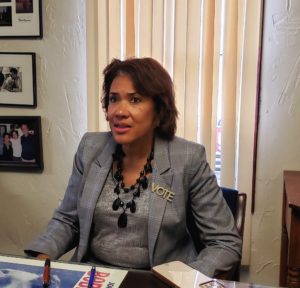
Mayoral candidate Karen Weaver during an interview with East Village Magazine conducted in her campaign headquarters on Court St. in downtown Flint. (Photo by Tom Travis)
Before launching her political career, she was director of behavioral services at Mott Children’s Health Center; and later chief operating officer of Ennis Center for Children,
Never having been in elected office, she ran for mayor in 2015 and won, defeating embattled incumbent Dayne Walling at the height of the water crisis. She was the first female mayor in the city’s history.
In a bid for re-election in 2019, she lost to Sheldon Neeley by 205 votes, 48.4 per cent to Neeley’s 50.5.
Why do you want to be mayor (again)?
“I care about Flint. Flint needs a leader and I haven’t seen one. Flint needs to be at tables where opportunities are available – but nobody has been advocating That was just striking. I want to serve the residents.
“I am a mental health professional by training. The city has been emotionally battered and bruised and my training comes in really handy.
“When you’re raised in a family like mine,” Weaver asserted, “You want to make an impact.”
But she said when she left office after the tough 2019 loss, she truly did not imagine running again.
She went to Florida to try to recuperate. One day she called Hillary Clinton — tapping a relationship between the two women that had bloomed during Clinton’s support for the city and for Weaver’s efforts during the water crisis.
“I need to talk,” Weaver said she said to Clinton, who obviously had confronted her own devastating loss. In response, Clinton invited her come see her. Weaver flew from Florida to New York, and the two met for two and a half hours in Clinton’s Manhattan office. They talked about how they coped with their losses, about misogyny and sexism in politics, and about Flint. At the end of the afternoon, Clinton turned to Weaver and said, “Mayor Weaver, go back and get your seat.”
Weaver was gobsmacked. “I never thought I would do that. I just listened to her.” When Weaver told her husband, he said, “You’re not going to, right?” She said, “No, of course not.”
But three years later, here she is, sitting at a cramped upstairs conference table in her campaign headquarters on Court Street, enmeshed in a race to be decided Nov. 8 between her and Neeley. With a smile, she said her husband “came around” to her decision.
This time around, she noted, “You are not going to have me on back to back crises. I did not realize the emotional toll. I was exhausted — but I didn’t know it, I hadn’t stopped.”
What have you done since you left office? (This question obviously was specific to Weaver…Neeley addresses the issue in describing his time in office)
In early 2020, Weaver worked for Michael Bloomberg’s presidential campaign as part of his water/infrastructure task force. “I loved it,” Weaver said. She was in New York a lot, along with South Carolina, Arkansas, Georgia, advocating for his as a presidential candidate based on what he had done for Flint and for other mayors across the country. After Bloomberg dropped out of the race, she did Get Out the Vote (GOTV) support for the Hillary campaign.
For 14 months, she hosted a morning talk show on 910Detroit. Additionally, She became interim director of the 500-member African American Mayors Association; she had been second vice-president as mayor. In that role, at the height of social justice initiatives in 2020, the powerful year following the death of George Floyd, she said “There was a lot of money on the table, but there was no voice from Flint at that table” and it bothered her that Neeley wasn’t there advocating for the city. “That was striking,” she said.
What are your best arguments for why people should vote for you?
“My experience. I’m qualified. And when I was in office I was a fighter for Flint.”
“I am better qualified or I wouldn’t run against anybody. The experience I’ve already had as mayor – it’s a proven track record. The first two things I did were declare an emergency and fight for home rule,” she said, significant responses to the water crisis.
“I never thought that coming from a mental health and mental health administration background would be so relevant,” she said.
“This is a city where trust has been broken,” she said, adding that her training specifically offers the kinds of skills needed to address those issues.
“I didn’t see myself doing this again, but I can’t help it. This is a calling – that’s how it feels to me…somebody who’s not scared to fight for Flint. I’m a fighter.
“That’s a good quality to have –We get slapped in the face every time you turn around.
Also, she declares, “I’m truthful. Even if it’s bad news about us, you need to know it. I’m not going to tell you the water is good if it isn’t.
Weaver contends that during her tenure crime issues improved with the city getting out of the top 25 cities nationally — And that, she notes, was without the benefit of American Rescue Plan Act (ARPA) funds. She said “It bothers me those ARPA funds have been sitting here since last May.
And what do you envision your administration would do for the city of Flint going forward?
Weaver replied in most detail about the use of ARPA funds. Asked what actions would accompany the use of those funds, she said, “I would use those funds to address crime: more police, community policing, lighting up our city. So much happens in the dark. [The police] don’t have the equipment they need. They should have drones instead of a helicopter.” Drones, she notes, are less expensive, can fly lower, and get better visuals.
Second, Weaver said she would focus strongly on blight, directing ARPA funds into those efforts.
Blight is related to crime, she said — “cleaning this city up.” was one of the things Bloomberg was working on when he was in Flint, she recalled.
She said she also would address sports and recreation opportunities for city youth, noting that in her tenure as mayor, in response to the water crisis, outside funds from the U.S. Conference of Mayors supported basketball, baseball, and hockey opportunities.
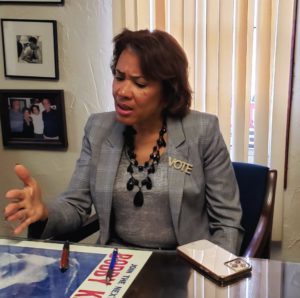
Mayoral candidate Karen Weaver during an interview with East Village Magazine conducted in her campaign headquarters on Court St. in downtown Flint. (Photo by Tom Travis)
“It was part of the healing,” she said. “We gave apprenticeships for those programs that offered real work, real pay, and most of those apprentices were young men and young women.”
“Why is the ARPA fund not spent yet? It’s the mayor. Other cities had plans waiting — they started putting press releases out about what they were going to do with the money. What stopped it up here? You know crime is out of control and blight is out of control – they waited too long, and the community members are saying, ”we’re all getting shot at here.”
“Some things I did not get to address, because the water crisis took over everything. People wouldn’t talk to you about other things…if you couldn’t drink the water they weren’t going to talk about anything else.
“The third year I finally got to start looking at some of these other things…economic development came back to the city for the first time in 14 years. Then they started talking about police and fire.”
How will you work with the Flint City Council?
“If we can’t come together, we’re not going to be able to get things done. I would try to reestablish trust. We’re going to have to do some of those things again.
“We weren’t perfect but we had laid a good foundation.
“We fought about things, but we were able to make some things happen as well. I had standing meetings with president of council, the finance chair — it’s a relationship. I would work even harder at that to move this city council.
“How can you unite a city if you’re not willing to sit down and at least try, talk with each other? I would hope everybody on that council would like a safe city, a clean city, economic opportunity for their residents. There could be some work done on both sides. The mayor is supposed to be a partner, you have to have some tough conversations.”
What would you do differently if given a chance to be mayor again?
“I would address misinformation: people lied on me. Some people said, take the high road, and I did. Sheldon Neeley would get on the radio and said I stole millions of dollars. But we had an RTAB [Receivership Transition Advisory Board, a follow-up to the emergency manager, a group of overseers appointed by the state] forever — they’d have marched me out of City Hall so fast because I had so many eyes on me.
What is your approach to staffing decisions? How do you plan to assemble a team?
“That’s a real simple answer,” Weaver responded. “I think about qualified staff and people who have a passion for the city, a passion for helping.
“We were able to do some incredible things. I wasn’t a politician, I still don’t feel like I’m a politician. Politicians said we got things done.
“I hired people that were talented and were proud to be part of something that was bigger than them – Flint was bigger than you. We’d be at City Hall all day…we’d have dinner. We kept working…We liked being there…it was 24-7. They were people qualified and capable to getting the job done.
What thoughts do you have about the city’s racial divide?
“There IS a racial divide in Flint — there has been for year,” she said. “That’s nothing new. But things are very tense right now.
“We’ve got to come together. We have to. I don’t care what color you are, there are things we should all agree on: I want a safe city, I want a clean city — with economic opportunities. What are the things we can come together on? A beautiful city, a clean city… We need to stop saying what divides us.
“Some of it depends on where on where you live: the north side, the east side have similarities.”
As became apparent during the water crisis, Weaver stated, “It wasn’t just race, it was class. There are things the east side and north side should be banding together on because they have similar things going on – people from both parts of town think they have been neglected.
“We need to go out with town halls and promote economic development. During the water crisis, we wanted people to know that their thoughts, their opinions were valued. We have to get out into the community more. I hope I lead by example. We ought to be able to sit down and put [our differences] behind us and find what do we agree on?
“We have to have hard conversations…we don’t want to have them: we just say, the white people this, the black people that [on city council]/ We could be respectful…it should be simple, but it hasn’t been simple.
“Why do people are the north side feel this way? Why do people on the east side feel this way? We need truth and racial healing.
“And there are practical issues that need to be addressed across the neighborhoods — potholes in the streets, no accessible grocery stores.
“We don’t have grocery stores where I live — but I have a car. I can get there. That’s something that all Flint residents need,” she said.
She also recalled that a process of “truth and racial healing” funded by the Kellogg Foundation began during the water crisis, but did not sustain over time.
“The water crisis brought us together initially, but when you start looking at class, that where the division comes in…it was racial, it was class, it was both of those things.”
What are your views about the separation of church and state and the role of Flint faith communities?
“We talk about bringing the city together – how do you say I’m going to exclude a certain group?”
“So many residents look to their clergy for guidance and direction…we have an obligation, a responsibility to keep them in Flint.
“When we needed people to go to Lansing to fuss with Snyder, there were the pastors. Many people look to them as role models, as leaders, many of them live in the city. If you have a flock, you’re concerned about them.
“They have a stake in what’s going on. I welcome them just like I welcome the business community. They cared about access to clean water for everybody in the city of Flint.”
How do you regard where the city stands now with the water crisis — the settlement, the dropping of charges against the state officials by the Attorney General?
I’m appalled at both things. What we should be talking about eight years later is lessons learned and how can we help other cities. Instead, there are still families that don’t have their pipes changed and you wonder why people don’t trust the response. It’s ridiculous. The problem is still there — there still are hot spots, and an outbreak of Legionnaires in the Sixth Ward; chlorines levels going down…lead levels going up again.
No one’s been held accountable for not completing it all this. And appliances and fixtures needed to be fixed — if the water is going through old fixtures with lead, you still don’t have access to clean water.
As to the dropping of the charges, Weaver said, she is “So outraged and angry, and we ought to be…because no one has been held accountable about anything that’s happened in Flint.
“And that was reflected in the charges and in the settlement. You don’t even hear outrage that the pipes how not been completed. Flint needs to not go out of the national spotlight, because what happens in Flint is going to set a precedent for what is going to happen in other places.
Weaver had commented angrily about the settlement in 2020, reported in this excerpt from an East Village Magazine story:
“It’s a slap in the face…” Former Mayor Karen Weaver said
At a rally in front of City Hall in December 2020, former Mayor Karen Weaver delivered a fiery speech about the Water Crisis settlement, when the amount then stood at $641 million, “It’s a slap in the face and a kick in the behind. The State brought a piggy bank when they should have brought a safe. They brought a piggy bank to pay us and it’s not right to pay between 80,000 and 100,000 people.”
What do you see as the city’s relationship with the schools and public education?
“You have to have a successful, thriving school system…We’re in a bad place now. if we want to bring people to Flint and keep people in Flint we’re going to have to do some work.
“I graduated [from Flint Northern} in ’77 — back then, people from all over the country were coming to Flint to study our successful school system. There are things that we can work on together…how can we be helpful? We should have a liaison between the city and the school district: we could have a strong partnership…and we need to.
Regarding the Mott Foundation’s offer to support the school district with an offer of about $200 million to build new schools, Weaver said she recalled that during her tenure, it felt like, “We were all at the table together; we agreed on the need to have new schools. Now everybody’s waiting to see who’s going to be there before we move (15 candidates are vying for five seats on the Flint Board of Education Nov. 8) We do need good schools…we need good learning environments for our children. The philanthropy community in Flint needs to have a seat at the table – needs to be part of this conversation.”
What about housing? [Weaver requested to comment on this issue, though it was not on our question list.]
With ARPA dollars, we need to start building up…we’re not going to attract people if they can’t find a place to live. Some people don’t like the busy-ness of downtown – they want single family homes, they want neighborhoods, Some homes can be rehabbed…we need to give people these kinds of options if they want to come here. ARPA dollars could help.
What do you wish we had asked you that we didn’t? Or what concluding comments would you offer?
“We have a lot of opportunity in Flint to make some good things happen,” Weaver asserted, “and that’s another reason I’m running – because I see it. Where you see abandonment and problems, I think, ooh, we could do something about that.
“I get excited about what we CAN do…when we talk about uniting, what are the things we want to see happen in this community and how can we make it happen? What are the things we agree on? Let’s start there, and work on those together.”
EVM Editor Tom Travis can be reached at tomntravis@gmail.com. EVM Consulting Editor Jan Worth-Nelson can be reached at janworth1118@gmail.com.


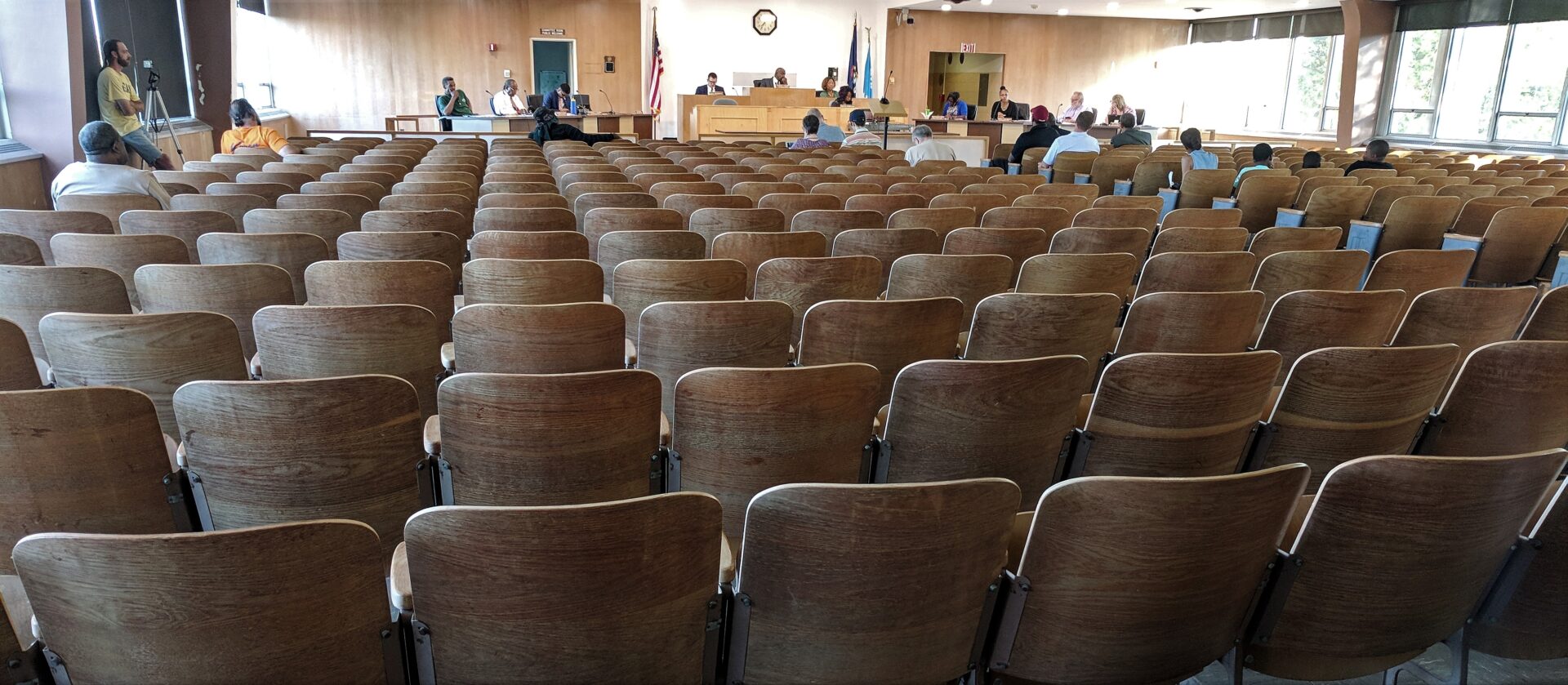


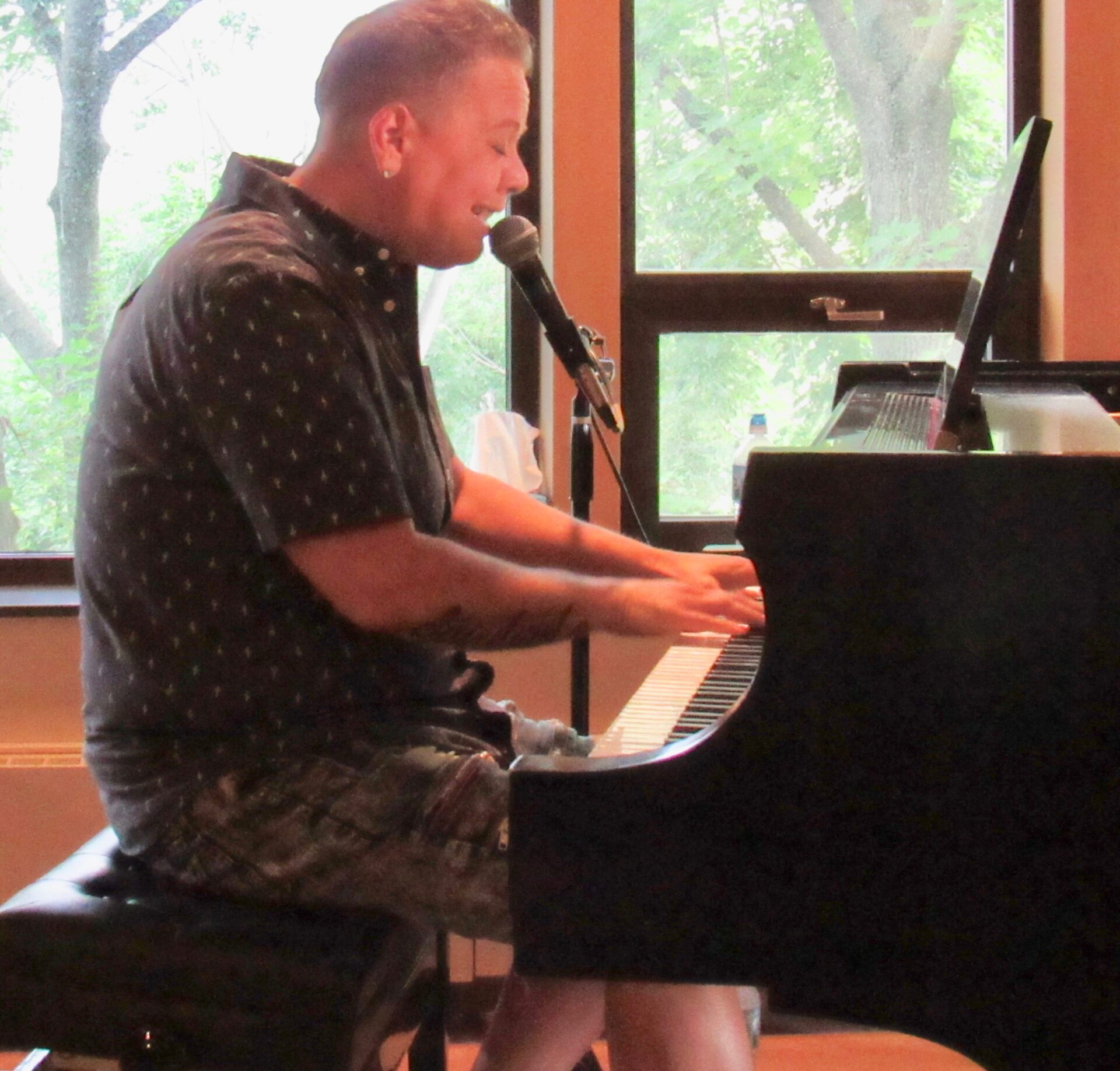
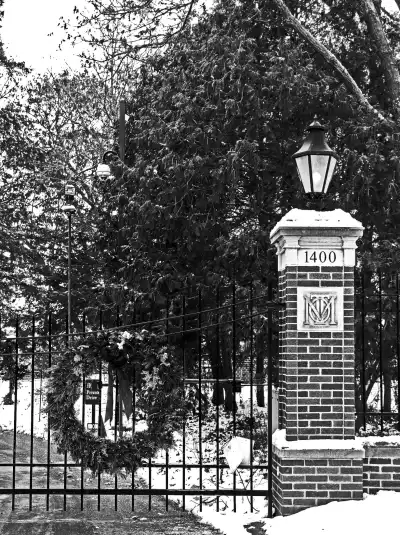

You must be logged in to post a comment.